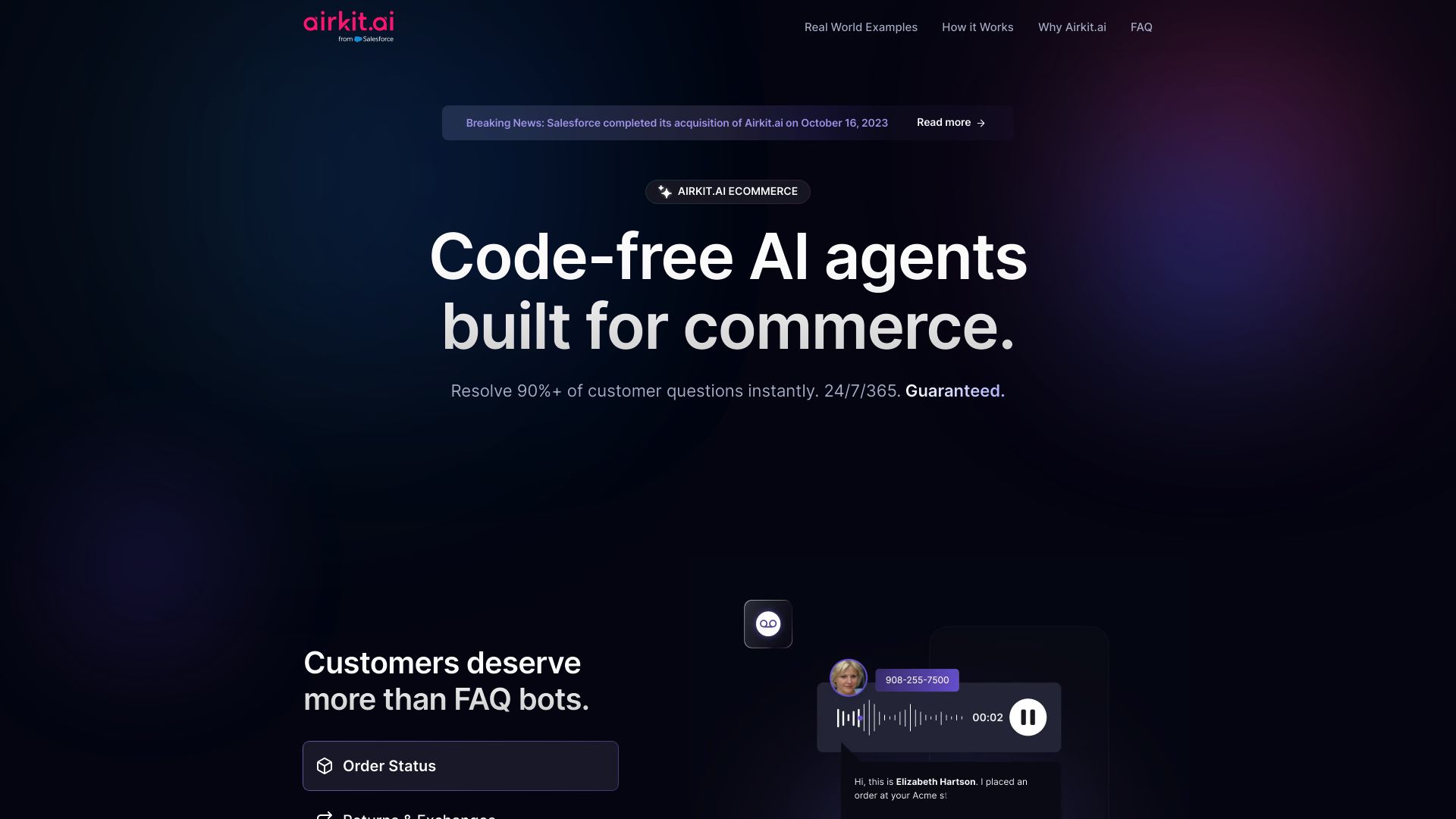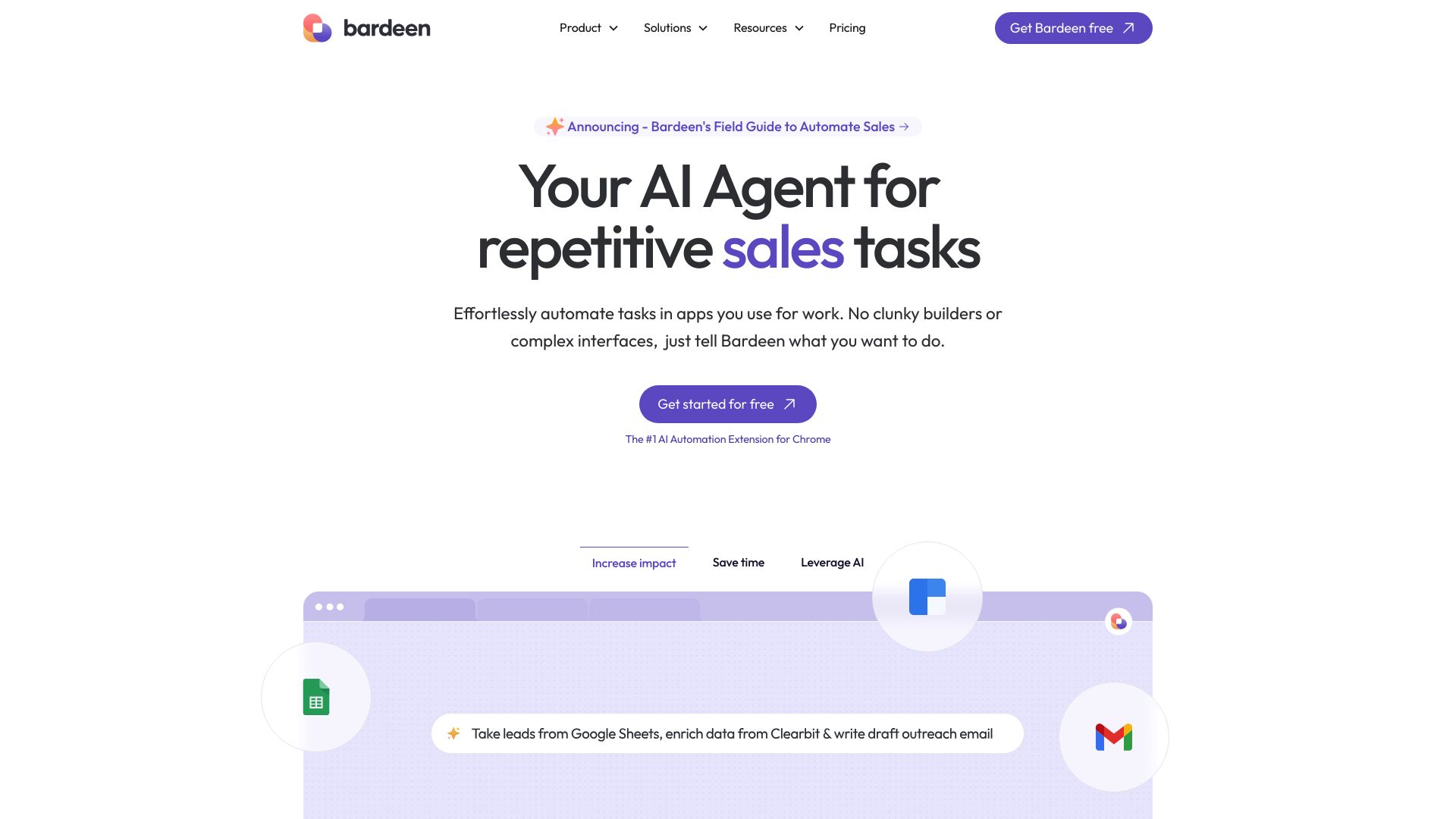Airkit AI vs. Bardeen AI: Comparing AI Automation Platforms
AI-powered automation revolutionizes how businesses operate, with platforms like Airkit AI vs. Bardeen AI, and SmythOS leading the charge. This comparison delves into the unique strengths and limitations of each solution, exploring their approaches to customer service, web automation, and AI agent deployment.
We examine key features, integration capabilities, and security measures to help you identify the most suitable platform for your needs. Whether you’re a developer seeking advanced AI capabilities, a business leader focused on scalability, or a non-technical user looking for accessible tools, this analysis provides valuable insights to guide your decision-making process in the dynamic world of AI automation.
Airkit AI Overview
Airkit AI delivers AI-powered customer service solutions for businesses seeking to automate support tasks. Acquired by Salesforce in 2023, Airkit AI specializes in no-code AI agents tailored for ecommerce and customer service applications.


Airkit AI’s platform enables rapid deployment of AI agents capable of resolving customer queries across multiple channels including web chat, mobile, voice, and email. These agents leverage continuous learning to improve their ability to handle complex issues over time. Key features include pre-built conversational skills for ecommerce, integration with existing helpdesk systems, and the ability to instantly resolve over 90% of repetitive customer requests.
Airkit AI’s platform enables rapid deployment of AI agents capable of resolving customer queries across multiple channels… and the ability to instantly resolve over 90% of repetitive customer requests.
The platform’s strength lies in its focus on ecommerce and customer service use cases. Airkit AI’s no-code approach allows businesses to deploy intelligent agents within hours, making it accessible to non-technical users. The integration with Salesforce Service Cloud provides a robust environment for managing customer interactions at scale.
While Airkit AI excels in automating customer support for ecommerce, it may have limitations for users seeking more general-purpose AI agent development tools. The platform’s specialized focus could potentially restrict its applicability in non-customer service domains. Additionally, the lack of a visual builder and some advanced features like multi-agent collaboration might be drawbacks for users requiring more complex AI implementations.
Airkit AI’s acquisition by Salesforce positions it as a significant player in the AI-powered customer service landscape. The platform’s ability to rapidly automate support tasks while integrating seamlessly with existing CRM systems makes it a compelling choice for businesses looking to enhance their customer service capabilities through AI technology.
Bardeen AI Overview
Bardeen AI offers a no-code web automation platform that empowers users to streamline repetitive tasks through a Chrome browser extension. The platform’s visual workflow builder allows users to create custom automations, called Playbooks, without coding expertise.


Bardeen AI’s key features include a drag-and-drop interface for building workflows, a library of pre-built actions for popular apps like Gmail and LinkedIn, and AI-powered capabilities such as text classification and data extraction. The platform leverages advanced models like GPT-3 to enhance its automation capabilities.
Bardeen AI offers a no-code web automation platform that empowers users to streamline repetitive tasks through a Chrome browser extension.
The software stands out for its focus on personalized automation, allowing users to create tailored workflows for their specific needs. Bardeen AI also incorporates human-in-the-loop interaction, enabling users to validate data, guide automations, and provide inputs when necessary.
While Bardeen AI excels in UI-based web automation with AI assistance, it has limitations in areas such as fully autonomous functionality, scalability, and deployment options beyond browser-based operations. The platform lacks advanced features like independent agents, complex orchestration, or enterprise-wide hosting solutions.
Bardeen AI’s vision centers on democratizing automation by enabling users to build workflows for repetitive tasks without coding expertise. This approach positions the platform as an ideal solution for individuals and small teams looking to enhance productivity through personalized, guided automations rather than completely hands-off processes.
Feature Comparison
Airkit AI and Bardeen AI offer contrasting approaches to AI-powered automation. Airkit AI specializes in customer service solutions, providing no-code AI agents for ecommerce and support tasks. Bardeen AI focuses on general web automation through a Chrome extension, allowing users to create custom workflows.
Key feature gaps exist between the platforms. Airkit AI lacks a visual builder, relying instead on pre-built conversational skills and no-code deployment. Bardeen AI offers a drag-and-drop interface for workflow creation but lacks autonomous agent capabilities. In core components, Airkit AI integrates deeply with Salesforce and customer service systems, while Bardeen AI emphasizes browser-based automation and integration with popular web apps.
Security features also differ. Airkit AI, designed for enterprise use, likely provides robust data encryption and compliance measures. Bardeen AI’s browser-based approach may offer less granular security controls. SmythOS surpasses both in this area, providing comprehensive security features like constrained alignment, data encryption, and IP control.
| Airkit AI | Bardeen AI | SmythOS | |
|---|---|---|---|
| CORE FEATURES | |||
| Visual Builder | ❌ | ✅ | ✅ |
| Memory & Context | ✅ | ❌ | ✅ |
| Autonomous Agents | ✅ | ❌ | ✅ |
| Explainability & Transparency | ❌ | ✅ | ✅ |
| Debug Tools | ❌ | ❌ | ✅ |
| Multimodal | ❌ | ❌ | ✅ |
| Problem-Solving Capabilities | ✅ | ❌ | ✅ |
| Multi-Agent Collaboration | ❌ | ❌ | ✅ |
| Audit Logs for Analytics | ❌ | ❌ | ✅ |
| Work as Team | ❌ | ✅ | ✅ |
| Agent Work Scheduler | ❌ | ✅ | ✅ |
| SECURITY | |||
| Constrained Alignment | ✅ | ❌ | ✅ |
| IP Control | ❌ | ❌ | ✅ |
| COMPONENTS | |||
| Foundation AIs | ❌ | ❌ | ✅ |
| Huggingface AIs | ❌ | ❌ | ✅ |
| Zapier APIs | ❌ | ❌ | ✅ |
| Classifiers | ❌ | ✅ | ✅ |
| Logic | ❌ | ❌ | ✅ |
| Data Lakes | ❌ | ❌ | ✅ |
| DEPLOYMENT OPTIONS (EMBODIMENTS) | |||
| Deploy as API | ❌ | ❌ | ✅ |
| Deploy as Webhook | ❌ | ❌ | ✅ |
| Staging Domains | ❌ | ❌ | ✅ |
| Production Domains | ✅ | ❌ | ✅ |
| API Authentication (OAuth + Key) | ❌ | ❌ | ✅ |
| Deploy as Site Chat | ✅ | ❌ | ✅ |
| Deploy as Scheduled Agent | ❌ | ✅ | ✅ |
| Deploy as GPT | ❌ | ❌ | ✅ |
| DATA LAKE SUPPORT | |||
| Hosted Vector Database | ❌ | ❌ | ✅ |
| Sitemap Crawler | ❌ | ❌ | ✅ |
| YouTube Transcript Crawler | ❌ | ✅ | ✅ |
| URL Crawler | ❌ | ❌ | ✅ |
| PDF Support | ❌ | ✅ | ✅ |
| Word File Support | ❌ | ❌ | ✅ |
| TXT File Support | ❌ | ❌ | ✅ |
Best Alternative to Airkit AI and Bardeen AI
SmythOS stands out as the superior alternative to Airkit AI and Bardeen AI for AI automation. Our platform offers a comprehensive suite of features that surpasses the capabilities of both competitors. SmythOS empowers users with autonomous agents, multi-agent collaboration, and advanced problem-solving capabilities.
Unlike Airkit AI’s focus on customer service or Bardeen AI’s browser-based automation, SmythOS provides a versatile foundation for creating AI agents across any industry or use case. Our visual builder and no-code options make agent development accessible to users of all skill levels, while still offering the depth and customization that experienced developers demand.
SmythOS provides a versatile foundation for creating AI agents across any industry or use case.
SmythOS excels in key areas where others fall short. We offer robust debugging tools, multimodal capabilities, and advanced security features including constrained alignment and IP control. Our platform provides unparalleled flexibility in deployment options, allowing seamless integration of AI agents into existing workflows as APIs, webhooks, scheduled tasks, or chat interfaces.
By choosing SmythOS, you gain access to a future-proof AI automation platform that evolves to meet the changing needs of businesses and developers. Our commitment to scalability, ethical AI practices, and user-friendly design ensures long-term value and innovation for your organization. With features like a hosted vector database and support for diverse data sources, SmythOS provides a solid foundation for enterprise-grade AI solutions, empowering you to harness AI’s full potential across unlimited use cases.
SmythOS provides a solid foundation for enterprise-grade AI solutions, empowering you to harness AI’s full potential across unlimited use cases.
Conclusion
Airkit AI and Bardeen AI offer distinct approaches to AI-powered automation, each with its own strengths and limitations. Airkit AI excels in customer service automation for ecommerce, while Bardeen AI focuses on personalized web-based task automation. However, SmythOS emerges as the superior choice, offering a comprehensive suite of features that address the limitations of both platforms.
SmythOS stands out with its versatile AI agent creation capabilities, extensive integration options, and flexible deployment choices. Unlike Airkit AI’s specialized focus or Bardeen AI’s browser-centric approach, SmythOS provides a robust platform for building and deploying AI agents across various use cases and environments. Its visual builder, coupled with no-code functionality, makes it accessible to both technical and non-technical users, surpassing the offerings of Airkit AI and Bardeen AI.
For businesses and individuals seeking a powerful, scalable, and secure AI solution, SmythOS is the clear winner. Its advanced features like multi-agent collaboration, autonomous operation, and comprehensive security measures set it apart from the competition. We invite you to explore SmythOS’s capabilities and experience the future of AI automation. Create a free SmythOS account today and discover how our platform can transform your AI initiatives.
Last updated:
Disclaimer: The information presented in this article is for general informational purposes only and is provided as is. While we strive to keep the content up-to-date and accurate, we make no representations or warranties of any kind, express or implied, about the completeness, accuracy, reliability, suitability, or availability of the information contained in this article.
Any reliance you place on such information is strictly at your own risk. We reserve the right to make additions, deletions, or modifications to the contents of this article at any time without prior notice.
In no event will we be liable for any loss or damage including without limitation, indirect or consequential loss or damage, or any loss or damage whatsoever arising from loss of data, profits, or any other loss not specified herein arising out of, or in connection with, the use of this article.
Despite our best efforts, this article may contain oversights, errors, or omissions. If you notice any inaccuracies or have concerns about the content, please report them through our content feedback form. Your input helps us maintain the quality and reliability of our information.
